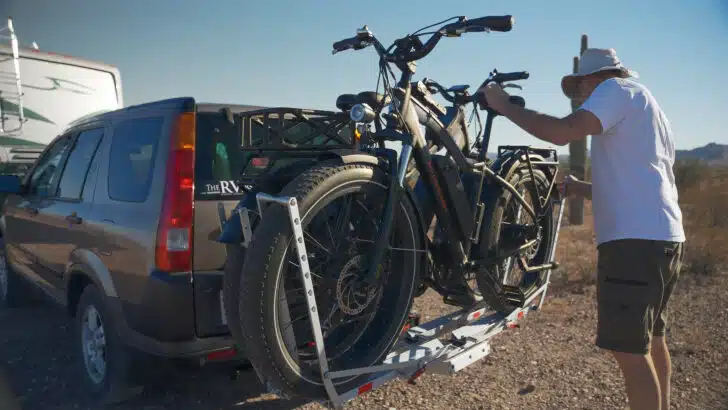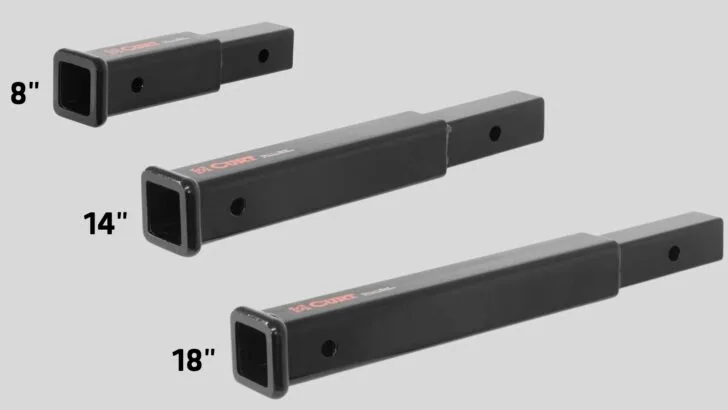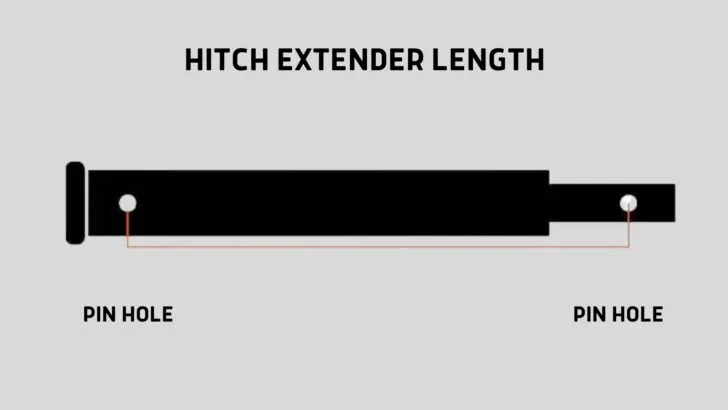When the receiver tube on your hitch isn’t long enough to clear an item like a spare tire, bike rack, or RV bumper rack, a hitch extender could be the answer.
But there are several important things to know before putting any sort of hitch extension to work. In this post, we’ll tell you how to use a hitch extender safely and effectively in the right circumstances.
- 1) What Is a Hitch Extender?
- 2) What Are the Benefits of Using a Hitch Extender?
- 3) Factors to Consider When Choosing a Hitch Extender
- 4) How to Measure for a Hitch Extender
- 5) How to Use a Hitch Extender Safely
- 6) Quality Hitch Extenders
- 7) Hitch Extender Alternatives
- 8) Free RVing Tips, Tricks, Reviews, Giveaways & More
What Is a Hitch Extender?
A hitch extender is an accessory that slides into a trailer hitch to extend the length of the receiver tube. Its purpose is to provide additional space/clearance between the RV or tow vehicle, and the trailer or car being towed.
There’s a shank on one end that slides into your hitch’s receiver tube (just like the shank/stinger on a standard ball mount does), extending the distance behind the towing vehicle to provide additional space.
So, a hitch extender increases the length of your receiver hitch tube. That additional space between the two vehicles allows extra room for an item such as a cargo carrier or bike rack.

A hitch extender can be used on the hitch of an RV, truck, or other vehicle to extend the length of the hitch. Here you see our 1Up bike rack with our RAD e-bikes mounted on the back of our Honda CR-V. If we wanted to mount the bike rack on the back of the RV, we could create the additional space needed by using a hitch extender.
What Are the Benefits of Using a Hitch Extender?
Using a hitch extender can be beneficial in several different ways.
A Hitch Extender Provides Increased Clearance
The extension opens up the amount of space between the back of the towing vehicle and the front of the trailer or car being towed. That space can then be used for a bike rack, cargo carrier, or other platform. Even if you’re not towing, additional space may be needed on the back of your rig. These are the primary and most common uses of a hitch extender.
For example, let’s say you have a Class B RV with a spare tire mounted on the back of the rig, and you want to use a hitch-mounted bike rack. You may need a hitch extender to shift the bikes rearward to prevent them from constantly bumping into your spare tire. Without an extender, the bikes may not fit at all with the spare tire in place.
A Trailer Hitch Extender Can Provide Improved Maneuverability
In some cases, an extender can be helpful in improving maneuverability when towing, backing, and turning. The added distance between the towing and towed vehicles allows tighter turns without conflict. Moving the towed vehicle further away from the towing vehicle increases the distance between them on both straightaways and turns.
Factors to Consider When Choosing a Hitch Extender
There are several factors to consider when purchasing an extender for your setup.
Length of the Hitch Extender
They come in various shank sizes and lengths for different towing configurations. There are cons/drawbacks to using one of these devices related to their length. You’ll want to buy the shortest model that will meet your needs. More on this below.

Here you see three hitch extenders of various lengths from Curt Manufacturing.
Weight Capacity of the Extender
As with most towing gear, each model has a maximum weight capacity, which the manufacturer sets. It’s crucial that you choose an extender with a weight capacity appropriate to your setup. As always, weight capacities should never be exceeded under any circumstances.
Compatibility with Your RV or Vehicle
Depending on whether you’re seeking to extend the hitch on your RV, truck, or car, you’ll need to be sure to buy a hitch extender that’s compatible with the rig/vehicle. Both the size of the receiver and the maximum capacity of the hitch have to be taken into consideration.
How to Measure for a Hitch Extender
You’ll need to take three measurements to choose the right extender for your setup.
Receiver Tube & Pin Hole
First, you’ll need to know the size of your receiver tube. This measurement is taken from side to side on the inside of the receiver tube. Most receiver tubes are 1 1/4″, 2″, or 2 1/2″. There are 3″ receiver tubes available for some large trucks, but these are much more rare. 2″ is probably the most common size receiver tube.
At the same time, you’ll want to take note of the diameter of the pin hole. You’ll want the pin hole of your extender to be the same size as the pin hole on your receiver. If the pin hole on your vehicle’s trailer hitch is 3/4″ be sure any extension you choose is the same size.
Accessory Shank
The receiver end of your extender will need to fit the shank/stinger of your hitch accessory (cargo box, bike rack, etc.). Here again, you’ll find that most accessory shanks are 1 1/4″, 2″, or 2 1/2″.
Extender Length
When you’re determining what length you’ll need, keep in mind that extenders are measured from the pin hole on the receiver end to the pin hole on the shank. That means a 14″ extender will move your hitch back exactly 14″.

A hitch extender is measured from pin hole to pin hole.
How to Use a Hitch Extender Safely
One of the most important factors to consider when setting up an extender is weight capacity. In order to safely use one, you must observe the weight ratings provided by the manufacturer at all times. That includes both gross trailer weight and tongue weight capacities.
The most important thing to remember is to use the lowest-rated component in your towing system as your limiting factor.
You also need to be aware that both towing and tongue weight capacities of the hitch will be reduced when an extender is used. One that’s less than 12″ long will reduce your load capacity by 25%. An extender that’s more than 12″ long will reduce your load capacity by 50%! Details should be provided with the extender, and in order to use one safely, you need to observe those reduced limits.
With all that in mind, it can be perfectly safe to use a hitch extender IF you stay within those guidelines. People use them all the time, but it needs to be done correctly.
Quality Hitch Extenders
There are a number of brands on the market. When it comes to towing, safety is paramount, so you want to be sure to buy a reputable name. Following are a few examples of hitch extensions in various lengths.
CURT 7-Inch Trailer Hitch Extension
- Fits 1-1/4" Receivers
- 7" Length - 1 1/4" Internal Dimension
CURT 18-Inch Trailer Hitch Extension
- ADDED CLEARANCE. This trailer hitch extension adds 18 inches of extra length to your hitch receiver, providing additional clearance between your...
- STANDARD FIT. This receiver hitch extension bar has a 2-inch x 2-inch shank to fit any industry-standard 2-inch trailer hitch receiver
RoadMaster 7.5” Hitch Extension
- Product Type: Auto Accessory
- Package Quantity: 1
Bonus:
To help lock the extender into the receiver in an effort to prevent noise and movement:
Roadmaster Quiet Hitch for 2” Receivers
- Bolts on in seconds
- Works on most 2-inch hitch receivers
Hitch Extender Alternatives
Most extenders range in length from 8″ to 18″. However, if you don’t want to extend your hitch 8″, or if you simply don’t want to use a hitch extender at all, you may be able to use a ball mount with a longer shank instead. For more on ball hitches, see our post on ball hitch sizes.
As a side note, since it’s possible that extending the hitch length could increase the amount the trailer tongue drops when connected, you may need to take into consideration the proper trailer hitch height. You may also need an extra trailer hitch lock to ensure your extender and ball mount are both secured to the towing vehicle.
Driving a diesel pusher? Now that you’ve got your extender installed, are you tired of seeing oil splatters from your engine all over your bikes and toad? Check out our video tip for reducing that annoying problem:
Free RVing Tips, Tricks, Reviews, Giveaways & More
Subscribe to our daily newsletter! We’ve been full-time RVers for 20 years (!) and share everything we’ve learned about RVing in our daily blog posts. Join our online community to receive a wealth of great RVing knowledge delivered right to your inbox.
Whether this is your first time on the road or you’re a seasoned full-timer, you’ll love the wide range of RVing topics we cover. Don’t miss a single article or any of our famous RV gear Giveaways — Subscribe today!






Harvey serota
Monday 10th of July 2023
You should mention the blue ox 12 hitch extender which does not change the towing capacity It’s solid steel and you pay the price but it’s worth it. It allows you to make a full u turn when towing a large pickup truck all four down without jack knifing
TheRVgeeks
Tuesday 11th of July 2023
Hi Harvey. That Blue Ox 12" extender is designed hitch-mounted accessories or for 4-wheels-down flat towing another vehicle. But in their documentation, they mention the following:
Note: This hitch extender is designed for using hitch-mounted accessories or for flat towing only. Do not use to tow a trailer. Using this extension will reduce your hitch's tongue weight capacity by 50 percent.
So the same rules apply when towing a trailer.
Erik Basilier
Monday 10th of July 2023
I am on my second truck/travel trailer combination. In both cases, when I try to open the tailgate while hooked up, it hits the tongue jack. It looks like a hitch extension of just 1 inch would suffice to eliminate the problem. I understand that such an extension would have a negative impact on equipment ratings, but I think the impact would be much smaller than with the much longer extensions mentioned in the article. Don't many others have the same need? Why can't I find a really short extension on the market?
Erik Basilier
Monday 10th of July 2023
@TheRVgeeks, The hitch ball mount is part of the Equal-i-zer hitch, so I don't see a way to replace it. It is mounted to the 2 1/2"receiver through the adapter provided with the RAM truck, so maybe it is possible to find a longer version of such an adapter?
TheRVgeeks
Monday 10th of July 2023
Sorry to hear about that, Erik. It does seem like the towing equipment manufacturers haven't quite figured out that most people are towing with a pickup truck and would like to be able to open the tailgate without it hitting. Seems like that should've been top of the list on the original design spec. But, go figure.
Instead of getting a hitch extender (which, as you've already seen, typically come in larger lengths than you need and reduce the towing capacity), you could consider finding a hitch ball mount that's slightly longer than the one you have now. Possibly a multi-ball option (like this one on Amazon) may be just enough longer than your current mount that it would allow the tailgate to open completely. And would have the benefit of not reducing your maximum towing capacity.